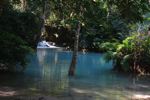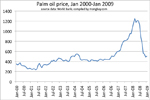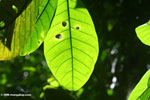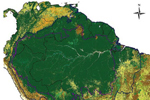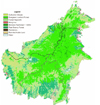FEATURED ARTICLES [Latest news updates]
Laos emerges as key source in Asia's illicit wildlife trade [Yale e360]
(02/26/2009) Now on Yale enviroment360: Long an isolated land with abundant forests and biodiversity, Laos is rapidly developing as China and other Asian nations exploit its resources. One of the first casualties has been the wildlife, now being rapidly depleted by a thriving black-market trade.
[Laos | Wildlife trafficking | Conservation | Wildlife]
Photos from Laos
(02/26/2009) I spent most of January in Laos and Thailand looking at the wildlife trade, conservation, and other issues. Here are some pictures from Laos.
[Laos pictures]
Beef consumption fuels deforestation
(02/16/2009)
Nearly 80 percent of deforestation in the Brazilian Amazon results from cattle ranching, according to a new report by Greenpeace. The finding confirms what Amazon researchers have long known – that Brazil's rise to become the world's largest exporter of beef has come at the expense of Earth's biggest rainforest. More than 38,600 square miles has been cleared for pasture since 1996, bringing the total area occupied by cattle ranches in the Brazilian Amazon to 214,000 square miles, an area larger than France. The legal Amazon, an region consisting of rainforests and a biologically-rich grassland known as cerrado, is now home to more than 80 million head of cattle. For comparison, the entire U.S. herd was 96 million in 2008.
[Amazon | Brazil | Cattle ranching | Deforestation | Rainforests]
Kerry, Lugar: U.S. has opportunity to lead on climate, forest conservation

|
|
(02/09/2009)
The United States can reassert itself as a global leader on the environment by supporting an initiative to fight climate change by protecting forests, said leaders from a broad range of political, environmental, development and business communities at a meeting on Capitol Hill Monday. Joined by senators John Kerry (D-MA) and Richard Lugar, the "Avoided Deforestation Partners" coalition called for Congress to include "strong tropical forest protection measures in U.S. climate change legislation" ahead of this December's climate conference in Copenhagen, Denmark.
[Avoided Deforestation | Deforestation | Conservation | Rainforests]
New model uses carbon credits, sustainable palm oil to save Indonesia's rainforests

|
|
(02/05/2009) The World Resources Institute (WRI) has launched an innovative avoided deforestation model that aims to deter conversion of Indonesian rainforest for oil palm plantations. The project, dubbed "POTICO" (Palm Oil, TImber, Carbon Offsets), integrates sustainable palm oil, FSC-certified timber, and carbon offsets in order to "divert new oil palm plantations onto degraded lands and bring the forests that were slated for conversion into certified sustainable forestry".
[Indonesia | REDD | Avoided deforestation | Palm oil]
Seeking out the world's rarest and most endangered birds
(02/02/2009)
For an evolutionary biologist there is no conservation group whose work is more exciting than EDGE, a program through the Zoological Society of London (ZSL). Unique in the conservation world, EDGE chooses the species to focus on based to the threat extinction and their evolutionary distinctness. Katrina Fellerman, an evolutionary biologist herself and the EDGE birds' coordinator, describes the organization as one that focuses on species, which "to put it bluntly, if lost, there would be nothing like them left in the world today". Fellerman explains further, "We use evolutionary distinctiveness (ED) as a species-specific measure of the relative evolutionary value of species - it is a way of apportioning conservation value according to a species’ phylogenetic position. Species with few or no close relatives on the 'tree of life' have the highest ED scores."
[Interviews | Conservation | Endangered species | Interviews with young scientists]
14,000-barrel oil spill in the Ecuadorean Amazon
(02/27/2009)
A ruptured oil pipeline caused 14,000 barrels of crude to spill into a river in the Napo region in northeast Ecuador, an area known for its high biological diversity, reports Reuters.
[Ecuador | Amazon | Oil]
Deforestation blamed for tiger maulings in Sumatra
(02/27/2009)
WWF has attributed six recent killings of villagers by tigers to deforestation in Sumatra. Habitat loss — together with prey depletion by hunting — is believed to be driving tiger-human conflict on the Indonesia island.
[Tigers | Sumatra | Deforestation]
Massive freshwater stingray takes 13 men to pull it ashore in Thailand
(02/27/2009)
It took ninety minutes and thirteen men to reel in an astounding specimen of giant freshwater stingray on the Ban Pakong River in Thailand. At seven feet wide and weighing an estimated 580-770 pounds (265-350 kilograms), the monstrous fish is thought to be the largest freshwater fish ever caught with a rod and line, according to Fishsiam, a company that provides fishing tours in Thailand.
[Thailand | Biodiversity | Fish]
Could America’s 700 billion stimulus have saved life on earth?
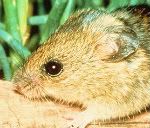
|
|
(02/26/2009) In a January op-ed in Science, ecologist Jaboury Ghazoul wistfully and wittily ponders how far the 789 billion stimulus bill recently passed by the US Congress could go toward saving our planet's embattled life-forms. In his essay, Ghazoul suggests we put the 700 billion “in the context of the species extinction crisis”. According to various scientific analyses the extinction rate is currently 100 to 1,000 times the average. Such a catastrophic loss of species—while making the world a lonelier and less interesting place—will unpredictably reshape ecosystems we depend on, causing social, political, and economic upheaval.
[Politics | Biodiversity | Conservation]
Illegal fishing estimated at $10-24B per year
(02/26/2009) Global losses from illegal and unreported fishing are estimated at $10-23.5 billion per year, according to a new study published in PLoS One. Analyzing fishing data from 54 countries, David J. Agnew of Imperial College London and colleagues estimate the "Illegal, Unreported and Unregulated" (IUU) fish catch at 11 to 26 million tons per each year. The authors found a strong link between governance and illegal fishing — illicit practices were most widespread in developing countries with poor monitoring and law enforcement. Estimated catches in West Africa were 40 percent higher than reported catches.
[Fish | Oceans | Fishing]
400-million-year-old fish at risk from harbor project
(02/26/2009)
A harbor project in Tanzania may put a population of coelacanth at risk, reports Nature News. A port development plan put forth by the Tanzania Ports Authority recommends building a deep-water harbor in Mwambani Bay near the Kenyan border. The port would accommodate large container ships which it hopes will bring economic development to the impoverished region. But the project could "will probably wipe out the local coelacanth population" according to a 2008 assessment by the Tanzania Natural Resource Forum (TNRF), a local environmental group, due to increased ship traffic, sedimentation, and other ecological changes.
[Fish | Oceans | Tanzania]
Ecstasy threatens rainforests in Cambodia
(02/25/2009)
Authorities, working with conservationists, have raided and closed several 'ecstasy oil' distilleries in Cambodia's Cardamom Mountains. The distilleries posed a threat to the region's rich biological diversity, reports Fauna & Flora International (FFI), the conservation group involved in the operation.
[Cambodia]
Whole Foods bans unsustainable palm oil from its products

|
|
(02/24/2009) America's largest organic grocer has announced its products will no longer use palm oil sourced from unsustainable producers, reports the Rainforest Action Network (RAN), an activist group that has led a campaign against destructive palm oil production. The move adds pressure on the palm oil industry to develop an effective and credible certification system for palm oil.
[Palm oil | Rainforests | Certification]
YouTube videos may be imperiling cuddly primate

|
|
(02/24/2009) Many "cute" and "cuddly" species have gained attention and funds from conservation groups, since the public gravitates toward such attractive species. In fact, cuteness can sometimes mean the difference between conservation attention and extinction. However, for slow lorises being cute may be their downfall. Despite the fact that owning a slow loris as a pet or trading it is illegal in all range countries and "all countries where primates as pets are illegal," the species is still heavily trafficked, says Dr. Anna Nekaris, an anthropologist who specializes in slow-loris research at Oxford Brookes University. During the past few years videos of pet slow lorises have begun to appear on YouTube. Such videos often include comments from users who push misinformation about the slow loris's legality and aptitude as pets, raising concerns among conservationists that the videos encourage people to actively pursue the slow loris as a pet.
[Pet trade | Wildlife trafficking | Wildlife]
Carbon dioxide monitoring satellite crashes immediately after launch
(02/24/2009)
The Orbiting Carbon Observatory, a $273 million satellite that would have collected measurements of carbon dioxide (CO2) in Earth's atmosphere to help better forecast the climate impacts of changes in CO2 levels, crashed about three minutes after launch, reports NASA. Researchers say the accident is a major setback for science.
[Remote sensing | Carbon dioxide]
Photos: Rarest cheetah photographed for the first time

|
|
(02/23/2009) With only 250 individuals left the Saharan Cheetah is on the brink of extinction. Little-studied, this imperiled subspecies has been photographed for the fist time by scientists from by the Zoological Society of London (ZSL) and Office du Parc National de l'Ahaggar (OPNA) using camera traps. "The Saharan cheetah is critically endangered, yet virtually nothing is known about the population, so this new evidence, and the ongoing research work, is hugely significant," said Dr Sarah Durant, a Senior Research Fellow with ZSL.
[Papua New Guinea | Deforestation | Rainforests]
Box turtles in Asia imperiled by massive trade
(02/23/2009) Massive international trade in Southeast Asian Box Turtles has driven the species to near-extinction in parts of Indonesia, according to a new report by TRAFFIC, the wildlife trade monitoring network.
[Papua New Guinea | Deforestation | Rainforests]
Biologists warn of rainforest mining threat from Alcoa, Newmont in Suriname

|
|
(02/23/2009) A prominent group of biologists are calling for Alcoa, Newmont Mining Corp, and other minerals conglomerates to forgo gold and bauxite mining operations in a biologically-rich zone in the South American country of Suriname. In a resolution issued last week, the Association for Tropical Biology and Conservation (ATBC) warned that mining on the Nassau Plateau, a 400-square-kilometer area of unprotected rainforest, would destroy habitats that support rare and endemic species — including several newly discovered species (catfish, frogs, and a stunning purple toad). Mining operations would further encourage the influx of wildcat gold miners in the area, increasing environmental damage and putting pressure on wildlife, the resolution said.
[Suriname | Mining | Rainforests]
ACCOR hotel chain linked to destructive logging in Borneo?
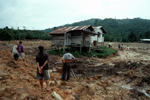
|
|
(02/23/2009) ACCOR, one of Europe's leading hotel groups, is cooperating with a Malaysian logging company blamed for destructive logging and attacks on Penan indigenous communities in Sarawak, claims an environmental group that has long campaigned on behalf of Borneo's forest people. The Switzerland-based Bruno Manser Fund reports that NOVOTEL is jointly building a 4.5-star hotel in the Sarawak capital of Kuching with the Malaysian tropical timber company, Interhill.
[Malaysia | Logging | Borneo]
24% of Papua New Guinea's rainforest destroyed or degraded by logging in 30 years
(02/23/2009) Nearly one quarter of Papua New Guinea's rainforests were damaged or destroyed between 1972 and 2002, report researchers writing in the journal Biotopica. The results, which were published in a report last June, show that Papua New Guinea is losing forests at a much faster rate than previously believed. Over the 30-year study period 15 percent of Papua New Guinea's tropical forests were cleared and 8.8 percent were degraded through logging.
[Papua New Guinea | Deforestation | Rainforests]
80% of wars between 1950-2000 took place in biodiversity hotspots
(02/22/2009)
80 percent of the world's major armed conflicts between 1950 and 2000 occurred in biodiversity hotspots, reports a study published in the journal Conservation Biology.
[Conservation | Biodiversity]
New fire record for Borneo, Sumatra shows dramatic increase in rainforest destruction
(02/22/2009) Destruction of rainforests and peatlands is making Indonesia more susceptible to devastating forest fires, especially in dry el Niño years, report researchers writing in the journal Nature Geoscience. Constructing a record of fires dating back to 1960 for Sumatra and Kalimantan (on the island of Borneo) using airport visibility records to measure aerosols or "haze" prior to the availability of satellite data, Robert Field of the University of Toronto and colleagues found that the intensity and scale of fires has increased substantially in Indonesia since the early 1990s, coinciding with rapid expansion of oil palm plantations and industrial logging.
[Indonesia | Indonesia | Palm oil | Sumatra | Borneo | Forest fires]
Clinton, Obama botch opportunity on climate, forest conservation
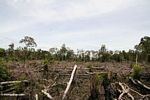
|
|
(02/20/2009) The Obama administration squandered a chance this week to show U.S. leadership on climate and forest conservation issues, when Secretary of State Hillary Clinton, during a visit to Jakarta, failed to bring up a new Indonesian government decree allowing conversion of carbon-rich peat forests to oil-palm plantations. Scientists say the decree, which apparently met the approval of Indonesia's Ministry of the Environment on Wednesday, will result in massive greenhouse gas emissions from the degradation and destruction of peatland ecosystems.
[Indonesia | Environmental politics | Palm oil | Peatlands]
Wild jaguar outfitted with radio-collar in U.S. for first time
(02/20/2009) The Department of Fish and Game in Arizona captured a jaguar south Of Tucson, Arizona and fitted it with a GPS radio collar. The jaguar, a well-documented male named ‘Macho’, is the first in the US to be fitted with such a collar, providing frequent updates on its movements.
[Cats | Wildlife | United States | Conservation]
Mongabay for kids now in Ukrainian
(02/19/2009)
Two of mongabay's web sites for children — on rainforests and Madagascar — are now available in Ukrainian. Mongabay for kids is now available in 28 languages. Other languages are in progress.
[Mongabay for kids]
Indonesia confirms that peatlands will be converted for plantations
(02/19/2009)
Indonesia's Minister for the Environment has approved a decree that will allow the conversion of carbon-rich peatlands for oil palm plantations, reports The Jakarta Post.
[Indonesia | Palm oil | Peatlands]
Iceland reaffirms whaling targets for 2009
(02/19/2009)
Iceland's interim government will allow whaling to continue through 2009 but left in question whether it would be permitted in the future, reports Reuters.
[Whaling]
High ivory prices in Vietnam drive killing of elephants in Laos, Cambodia
(02/19/2009)
Indochina's remaining elephants are at risk from surging ivory prices in Vietnam, according to a new report from the wildlife trade monitoring network TRAFFIC.
[Gabon | Rainforests | Carbon sequestration]
Rainforests absorb 20% of emissions annually
(02/19/2009) Undisturbed tropical forests are absorbing nearly a fifth of carbon dioxide released annually by the burning of fossil fuels, according to an analysis of 40 years of data from rainforests in the Central African country of Gabon. Writing in the journal Nature, Simon Lewis and colleagues report that natural forests are an immense carbon sink, helping slow the rise in atmospheric CO2 levels.
[Gabon | Rainforests | Carbon sequestration]
Amazon rainforest in big trouble, says UN
(02/19/2009) Economic development could doom the Amazon warns a comprehensive new report from the United Nations Environment Programme (UNEP). The report — titled GEO Amazonia [PDF-21.3MB] — is largely a synthesis of previously published research, drawing upon studies by more than 150 experts in the eight countries that share the Amazon.
[Amazon | Rainforests]
Cameroon gets gorilla park
(02/18/2009)
Cameroon has created a new national park to protect a population of 600 gorillas, along with other threatened species such as chimpanzees, forest elephants, buffaloes, and bongo.
[Sea turtles | Wildlife | Reptiles]
Illegal timber trade to face tough penalties in the E.U.
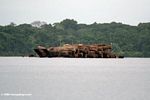
|
|
(02/18/2009)
Companies dealing in illegal timber may soon face stiff penalties under a proposed E.U. regulation. The European Parliament voted Monday to impose penalties on companies who use or trade illegally sourced timber. National authorities will have the power to impound timber of illegal origin, fine companies, and even shut down particularly egregious violators. Penalties will be "at least five times the value of the timber products" under the proposal, which will be voted on in April at Parliament's plenary session and then later by EU agriculture ministers.
[Logging | Europe | Environmental law]
Deforestation jumps 55% in Vietnam province
(02/18/2009)
Deforestation increased 55 percent during the past year in Vietnam's Dak Nong province, reports the Vietnam News Agency.
[Vietnam | Deforestation]
FARC killing Amazon rainforest Indians
(02/18/2009)
Several members of the Awa indigenous community have been killed by Revolutionary Armed Forces of Colombia (FARC) guerrillas in Nariño, a state bordering Ecuador, reports Human Rights Watch.
[Colombia | Indigenous people]
Climate change doubles coastal erosion in Alaska over 5-year period
(02/18/2009)
Coastal erosion along a 64-kilometer (40-mile) stretch of Alaska's Beaufort Sea doubled between 2002 and 2007, report researchers, who link the development to "declining sea ice extent, increasing summertime sea-surface temperature, rising sea level, and increases in storm power and corresponding wave action."
[Impact of climate change]
Little-known flatback sea turtle receives extra attention at symposium in Australia

|
|
(02/17/2009) Beginning today in Brisbane, Australia, the 29th annual Symposium on Sea Turtle Biology and Conservation will feature the flatback sea turtle, native to Australia and probably the least-studied of the marine turtle species. For a hundred years biologists debated as to how closely the flatback marine turtle was related to the green sea turtle. Several unique attributes of the flatback came to the forefront. The name ‘flatback’ describes the turtle’s distinct flattened carapace. The species also lays the largest eggs of any sea turtles, proportional to their size. However, perhaps most distinctly the flatback is the only marine turtle to call one nation home. The flatback forages, mates, and lays eggs along Australia’s coats; its penchant for swimming, rather than riding oceanic currents, keeps it from migrating across oceans as other turtle do.
[Sea turtles | Wildlife | Reptiles]
Universal phone charger to cut e-waste
(02/17/2009)
Mobile phone manufacturers will introduce a universal charger for handsets by 2012, reports CNN.
[Technology | e-Waste]
Climate change to have a big impact on marine fisheries
(02/17/2009)
Climate change will have a big impact on marine fisheries, report scientists writing in the journal Fish and Fisheries.
[Climate change | Fish | Oceans]
CO2 levels rise to a new record
(02/17/2009)
Atmospheric carbon dioxide concentrations climbed 2.28 parts-per-million (ppm) in 2008 to the highest level in at least 650,000 years — and possibly 20 million years — reports NOAA.
[Climate change | Carbon dioxide | Greenhouse gas emissions]
13,000 species found in Arctic, Antarctic Oceans

|
|
(02/16/2009) A marine census has documented more than 13,000 species in the Arctic and Antarctic Oceans, including several hundred that may be new to science. Conducted over a two-year period under often perilous conditions — including monster waves and dangerous polar bears — the series of 18 surveys turned up a wealth of information on the diversity, distribution and abundance of marine life. The research will also help establish a baseline for measure changes in polar ecosystems.
[Antarctica | Greenland-Arctic | Oceans]
Burning rainforests, melting tundra could accelerate global warming well beyond current projections

|
|
(02/16/2009)
Projections by the Intergovernmental Panel on Climate Change (IPCC) likely underestimate the scale and rapidity of climate change, warned a Stanford University scientist presenting Saturday at the annual meeting of the American Association for the Advancement of Science (AAAS) in Chicago.
[Climate change | Rainforests | Greenhouse gas emissions]
Pricing emissions from farming, logging could shift land use towards conservation
(02/15/2009)
Putting a price tag on carbon dioxide emissions resulting from various land use practices could dramatically change the way that land is used, including reducing deforestation and limiting agricultural expansion on carbon-rich lands, said a researcher presenting at the annual meeting of the American Association for the Advancement of Science.
[Agriculture | Carbon emissions]
Renowned climatologist says mass media ‘screwing up’ global warming reporting
(02/15/2009)
Stanford scientist and climate-specialist Stephen Schneider has called out media organizations for the quality of their reporting on climate change and other scientific issues. "Business managers of media organizations,” he said, “you are screwing up your responsibility by firing science and environment reporters who are frankly the only ones competent to do this."
[Climate change]
80% of agricultural expansion since 1980 came at expense of forests

|
|
(02/15/2009)
More than half of cropland expansion between 1980 and 2000 occurred at the expense of natural forests, while another 30 percent of occurred in disturbed forests, reported a Stanford University researcher presenting Saturday at the annual meeting of the American Association for the Advancement of Science (AAAS) in Chicago.
[Agriculture | Deforestation | Rainforests]
Japanese paper firms contribute to destruction of old-growth forests in Tasmania
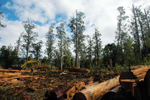
|
|
(02/15/2009)
A new report released by Australian conservation groups The Wilderness Society and Still Wild, Still Threatened shows that despite claims to the contrary, Japanese paper manufacturers are the purchasers of wood chips derived from the destruction of Tasmania’s old growth forests.
[Australia | Deforestation | Logging | Japan]
Indonesia may allow conversion of peatlands for palm oil
(02/15/2009) The Indonesian government will allow developers to convert millions of hectares of land for oil palm plantations, reports The Jakarta Post. The decision threatens to undermine Indonesia's efforts to reduce greenhouse gas emissions from land use and fashion itself as a leader on the environment among tropical countries.
[Indonesia | Deforestation | Palm oil | Peatlands]
Love puppet used to teach bird how to find mate

|
|
(02/14/2009)
At the Wildlife Conservation Society’s Bronx Zoo Paprika, a male red bird of paradise, presented a challenge for senior wild animal keeper, Patti Cooper. Upon his return from another zoo, Paprika came back with increased human imprinted behaviors, including speaking some English words. While entertaining to some, this wasn't helping him attract a female of his species. Not wanting to give up on him, Patty enlisted the aid of Carolyn Fuchs in WCS’s exhibit shop. Together Patty and Carolyn came up with the idea to create a female red bird of paradise puppet to broaden Paprika’s horizons and give him another chance at love.
[Birds | Animal behavior | Wildlife]
Fishermen - not whales as claimed by Japan - are the cause of fisheries depletion
(02/12/2009) Fishermen calling for a resumption of whaling to restore commercial fish stocks are taking the wrong approach, argue researchers writing in the journal Science. Analyzing data on fish catch and whale abundance off the coast of northwestern Africa and the Caribbean, Leah R. Gerber and colleagues show that fishermen remove far more fish than whales consume, undermining the agreement by whaling nations that whales are driving depletion of fisheries.
[Whales | Fish | Oceans]
Songbirds astonish scientists with speed of their migration, covering 311 miles a day
(02/12/2009) Using extra tiny geo-locator backpacks, researchers have tracked songbirds’ seasonal migrations for the first time, according to research published in Science . The researchers discovered that these beloved birds fly faster and further than anyone ever imagined. The data taken from the geo-locators surprised everyone. Stutchbury and her team discovered that during their migrations between Pennsylvania and South America songbirds flew more than 311 miles a day, three times higher than previous estimates.
[Birds | Animal behavior | Wildlife]
Payments for eco services could save the Amazon

|
|
(02/12/2009) Paying for the ecological services provided by the Amazon rainforest could be the key to saving it, reports a new analysis from WWF. The study, Keeping the Amazon forests standing: a matter of values, tallied the economic value of various ecosystem services afforded by Earth's largest rainforest. It found that standing forest is worth, at minimum, $426 per hectare per year.
[Amazon | Rainforests | Payments for ecosystem services | Ecosystem services | REDD]
Carbon market surges 84% in 2008

|
|
(02/11/2009) The value of the global carbon market surged 84 percent to $118 billion in 2008 despite the worldwide financial crisis, reports New Carbon Finance. Data from the market research firm shows that transaction volume for carbon dioxide emissions allowances reached four billion tons for the year, an increase of 42 percent over 2007.
[Carbon credits | Carbon trading]
France's Suez liable for illegal deforestation, "dynamite fishing" in the Amazon rainforest
(02/11/2009)
A consortium building the Jirau hydroelectric dam in Brazil near the Bolivian border has been ordered to pay roughly $3.5 million in fines for illegally logging nearly 50 acres (18.6 ha) of forest and using dynamite to kill 11 tons of fish in local rivers, reports the Spanish news agency EFE.
[Dams | Amazon]
Jaguar photographed for the first time in Central Mexico
(02/11/2009)
As a result of a research effort by the Autonomous University of the State of Mexico (UAEM) and the University of Alicante (UA), scientists have for the first time photographed a wild jaguar in central Mexico. The sighting has significant conservation implications, showing that the big cat still occurs in central Mexico despite persecution by hunters, habitat destruction, and depletion of prey.
[Wildlife | Mexico]
Climate change drives birds north
(02/11/2009)
Nearly 60 percent of the 305 species found in North America in winter have shifted their ranges northward by an average of 35 miles, according to an assessment by the Audubon Society.
[Wildlife | Birds]
Climate change may drive the Amazon rainforest toward seasonal forests rather than savanna
(02/11/2009)
Changes in rainfall resulting from climate change may drive the parts of Amazon rainforest toward seasonal forests rather than savanna, argue researchers writing in the Proceedings of the National Academy of Sciences
[Amazon | Rainforests]
Obama blocks offshore oil drilling for now
(02/11/2009)
The Obama administration has shelved a plan by the Bush Administration to open U.S. coastal waters to oil and gas drilling. The proposal, put forth on the last business day of the Bush Administration, had been vehemently opposed by environmental groups.
[Oil]
Middle class communities are worst managers of fisheries
(02/11/2009)
"Middle class" villages in Africa are more likely to deplete their fisheries than poor- and wealthy communities, reports a new study published in Current Biology.
[Fish]
South American fox confronts prey eight times its size
(02/10/2009)
In a paper in Mammalia researchers from the Wildlife Conservation Society (WCS) announce the first observation of South America’s culpeo fox hunting young guanacos, a relative of llamas. In doing so the fox comes head-to-head with aggressive mothers defending their young: researchers were surprised to find the small 30 pound (14 kg) predator facing off a group of 260 pound (120 kg) adult guanacos.
[Wildlife | Mammals | Carnivores]
Indonesian ecolabeling initiative providing cover for rainforest destruction
(02/10/2009) The Indonesian Ecolabel Institute is facilitating rainforest destruction by issuing "sustainable forest management certificates" to companies that convert natural and peatlands into industrial timber estates, allege national environmental groups.
[Certification | Indonesia | Rainforests]
Political violence in Madagascar may lead Daewoo to abandon controversial farm project
(02/10/2009) Political instability and low commodity prices may lead South Korea's Daewoo Logistics to delay or pull out of a controversial agricultural project in Madagascar, reports Reuters.
[Madagascar]
Salamander populations collapse in Central America
(02/09/2009)
Salamanders in Central America — like frogs, toads, and other amphibians at sites around the world — are rapidly and mysteriously declining, report researchers writing in the journal Proceedings of the National Academy of Sciences. Disturbingly, salamanders are disappearing from protected areas and otherwise pristine habitats.
[Amphibians | Conservation | Extinction]
408 mammal species discovered since 1993
(02/09/2009)
The discovery of 408 species of mammals — the planet's best-known group of animals — since 1993 demonstrates our poor understanding of global biodiversity, argue scientists writing in Proceedings of the National Academy of Sciences.
[Mammals | Conservation | Wildlife]
As sea ice retreats, swathe of Arctic closed to fishing
(02/06/2009)
The North Pacific Fishery Management Council (NPFMC) voted unanimously to close off more than 150,000 square nautical miles of the Arctic sea to commercial fishing. The decision, welcomed by an array of environmentalists and industry groups, is a preventative measure to protect fisheries that have become more accessible as a result of declining sea ice in the Arctic. It is the first time that the federal government has closed a fishery due to climate change instead of over-fishing, says supporters of the ban.
[Fishing | Marine conservation]
Boy Scouts of America have logged 34,000 acres of forest in 20 years
(02/06/2009)
A nationwide review of the Boy Scouts of America by Hearst newspapers has shown that one-third of Boy Scouts’ councils have been involved in logging to raise funds for the beleaguered organization.
[Forests | United States]
Tropical forest tree is source of new mosquito repellent as effective as DEET
(02/05/2009) Isolongifolenone, a natural compound found in the Tauroniro tree (Humiria balsamifera) of South America, has been identified as an effective deterrent of mosquitoes and ticks, report researchers writing in the latest issue of Journal of Medical Entomology.
[Medicinal plants]
Gravitational effects may boost sea level rise by 25% along U.S. coast
(02/05/2009) The melting of the West Antarctic Ice Sheet could cause sea level to rise more than previously predicted for some regions, including the U.S. coastline, report researchers writing in the journal Science.
[Sea levels | Oceans]
Frogs can be used to predict biodiversity hotspots
(02/05/2009) Tree frogs may help scientists inexpensively predict biodiversity hotspots for conservation, report researchers writing in the journal Science.
[Biodiversity | Atlantic forest]
Secretary of Energy warns of dire future for agriculture in California
(02/05/2009) Secretary of Energy Steven Chu warned climate change could severely impact California agricultural industry by the end of the century, reported the Los Angeles Times.
[Agriculture | California]
Indigenous rights' groups to oppose effort to certify 'sustainable' aquaculture
(02/05/2009) A coalition of indigenous rights' groups and grassroots environmental organizations will oppose the World Wildlife Fund's move to improve environmental stewardship of the aquaculture industry through a certification system.
[Aquaculture | Fish]
Butterfly tricks ants by mimicking their queen’s vocalizations
(02/05/2009) With cohesive hierarchical societies and a number of communication techniques, ants have been able to conquer a wide variety of ecosystems with great success. However, according to a recent paper in Science ants’ highly structured society at times comes with a price. A number of insects have evolved means to covertly infiltrate the ants’ society and live off their work and bounty by closely mimicking various ant communication methods. While scientists believe that these parasitical insects largely mimic ant communications like chemical exchange and physical contact—such as touching antennae—the study, however, discovered a butterfly which succeeds in infiltrating the highest echelons of ant society by vocalizing like a queen.
[Ecology | Insects | Animal behavior]
New York zoos, aquariums saved from funding cut
(02/05/2009) The New York State Legislature has rejected Governor David Paterson's proposal to cut funding for state zoos by 55 percent for 2009 after public uproar.
[Zoos]
Global warming to strengthen Arctic storms
(02/05/2009) Arctic storms could worsen due to climate change, putting fisheries, oil and gas exploration, and sea lanes at risk, warn researchers writing in the journal Climate Dynamics.
[Storms | Greenland-Arctic]
Brazil to boost spending on infrastructure to counter economic crisis
(02/05/2009) Brazil will increase spending on infrastructure projects by 28 percent to in response to the global financial crisis, reports Bloomberg.
[Brazil | Amazon]
Sustainable farming is the only way to feed the planet going forward
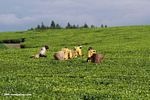
|
|
(02/05/2009) Embracing more sustainable farming methods is the only way for the world's farmers to grow enough food to meet the demands of a growing population and respond to climate change, the top crop expert with the United Nations Food and Agriculture Organization (FAO) said today.
[Agriculture | Farming]
Norway to pay Guyana to save its rainforests
(02/04/2009) Norway will provide financial support for Guyana's ambitious plan to conserve its rainforests, reports the Guyana Chronicle. Meeting in Oslo, Norway on Tuesday, Guyana President Bharrat Jagdeo and Norwegian Prime Minister Jens Stoltenberg signed a Memorandum of Understanding agreeing to establish a partnership to reduce greenhouse gas emissions from deforestation and forest degradation (REDD). The leaders will push for the incorporation of a REDD mechanism that includes low deforestation countries like Guyana in a post-2012 climate change agreement.
[Guyana | REDD | Avoided deforestation | Happy-upbeat environmental]
Google Earth now allows ocean exploration, tracking of sharks

|
|
(02/04/2009) Google Earth now allows users to dive beneath the surface of the world's oceans to see coral reefs, trenches, and other marine wonders. The new version, Google Earth 5, includes layers showing locations of shipwrecks and surf spots; routes for ocean expeditions; the movements of GPS-tracked sea animals; and information (including videos and images) about the ocean environment from sources including National Geographic, the Cousteau Society, the International Union for Conservation of Nature (IUCN), the Monterey Bay Aquarium, and the National Oceanic and Atmospheric Administration (NOAA).
[Remote sensing | Oceans | Technology]
Monstrous prehistoric snake provides glimpse of warmer tropical forests
(02/04/2009)
On Wednesday scientists announced the discovery of the world's largest snake, a prehistoric beast which preyed on giant turtles and crocodile-like reptiles in South America after the demise of the dinosaurs. As amazing as the discovery is, its greatest importance may be the clues it provides conservationists about the future of tropical forests under various global warming scenarios.
[Snakes | Fossils | Rainforests]
World's largest snake discovered: prehistoric serpent was twice the size of an anaconda
(02/04/2009) Paleontologists have recently uncovered the world's largest snake announces a paper in Nature. Measuring an astonishing 42 to 45 feet, the Titanoboa cerrejonensis makes the anaconda look diminutive. In fact the prehistoric serpent even makes once-ridiculous horror movie snakes appear conservative. "Truly enormous snakes really spark people's imagination, but reality has exceeded the fantasies of Hollywood," said Jonathan Bloch, one of the leaders of the party that discovered the prehistoric serpent. "The snake that tried to eat Jennifer Lopez in the movie Anaconda is not as big as the one we found."
[Snakes | Fossils | Rainforests]
Heart of Borneo conservation initiative at risk from Indonesian development plan
(02/04/2009) Indonesia's Defense Minister Juwono Sudarsono is pushing a proposal to develop economic zones along the border between Malaysia and Kalimantan "as soon as possible" for national security reasons, reports the Jakarta Globe. The plan — which Juwono claims is to protect Indonesia's sovereignty — would undermine the historic Heart of Borneo conservation initiative signed in 2007 by spurring massive expansion of logging, plantation development, and road construction in the biologically-rich region.
[Indonesia | Forestry | Borneo]
Malaysian government says forest reserve 'plundered' for oil palm development
(02/03/2009)
Responding to allegations by the Human Rights Commission of Malaysia (Suhakam) that indigenous people have been forced from their lands (a charge it denied), the Sabah Forestry Department said that more than 30 percent of Mt. Pock And Tanjong Nagos Forest Reserves were "plundered" by "people with means to plant illegal oil palm including companies" up until 2001. The statement is noteworthy in that leaders of the Malaysian Palm Oil Council, the marketing and lobbying arm of the Malaysian palm oil industry, have maintained that oil expansion has not taken place at the expense of natural forest in Malaysia.
[Palm oil | Forestry | Malaysia]
9 new frogs discovered in Colombia

|
|
(02/03/2009) Ten undescribed species of amphibians — including nine frog and one salamander — have been discovered in the mountains of Colombia, report scientists from Conservation International (CI). The "new" amphibians included spiky-skinned, orange-legged rain frog, three poison dart frogs and three glass frogs, named for their transparent skin. The amphibians were discovered during a recent Rapid Assessment Program (RAP) expedition in the Tacarcuna area of the Darien, near the border with Panama.
[Species discovery | Amphibians | Herps | Colombia]
12 new species of frogs discovered in India
(02/03/2009) A dozen previously unknown species of frogs have been discovered in the forests of Western Ghats according to a paper published in latest issue of Zoological Journal of Linnean Society, London. The 12 species have been identified following a revision of the Philautus genus and are the result of ten years of field study in Kerala, Tamil Nadu, Karnataka. Goa, Maharashtra, and part of Gujarat, in the Western Ghats. The Western Ghats are considered a global biodiversity hotspot for their species richness and the threats the mountain range faces.
[Species discovery | Amphibians | Herps | India]
Cellulosic ethanol healthier, better for the environment, than corn ethanol
(02/02/2009) Ethanol produced from switchgrass, prairie biomass, and Miscanthus will reduce the environmental and health impacts of expanded biofuels production relative to using corn as a feedstock, report researchers writing in the journal Proceedings of the National Academy of Sciences. The researchers simulated the impacts of a one-billion-gallon increase in U.S. production of the three fuels and found that the environmental and health costs of cellulosic ethanol are less than half the costs of gasoline and half to one-quarter the costs of corn-based ethanol.
[Cellulosic ethanol | Ethanol | Biofuels]
Nemo at risk from CO2 emissions? Ocean acidification may hurt baby fish
(02/02/2009) Increasing carbon dioxide concentrations in the atmosphere may have an unexpected impact on marine ecosystems: disorienting fish larvae. Research published in this week's issue of the Proceedings of the National Academy of Sciences (PNAS) found that ocean acidification disrupts the olfactory sense of clownfish larvae, making it difficult for the fish to find a habitat, which for clownfish is a sea anemone.
[Interviews | Conservation | Interviews with young scientists]
Chocolate has been a delicacy north of Mexico for a thousand years
(02/02/2009) Chocolate, produced from cacao beans, has been a part of American culture for a thousand years according to new paper published in the Proceedings of the National Academy of Sciences. Analyzing chemical residue from jars of native peoples in New Mexico, researchers Patricia Crown and Jeffrey Hurst discovered theobromine, a chemical signature of cacao. The jars have been dated from 1000 to 1125 AD, well over three hundred years before Columbus and the earliest recorded discovery of cacao north of Mexico. The cacao jars are from Pueblo Bonito, an archaeological site in Chaco Canyon, which is located in northwestern New Mexico. Chaco Canyon, once home to 2,000-5,000 inhabitants, was composed of a dense group of pueblos, of which Bonito was the largest. Incorporating 800 rooms, Pueblo Bonito was the center of a number of towns and villages in Chaco Canyon.
[Agriculture | Archeology | Mexico]
Embarking on a career in science? Mongabay launches interviews with young scientists series.
(02/02/2009)
Mongabay.com is excited to announce a new series of interviews with 'young scientists'. These interviews will focus on scientists who while only recently starting their career have already achieved notable success.
[Interviews | Conservation | Interviews with young scientists]
Amazon scientists awarded 'Nobel Prize' of conservation
(02/01/2009) Thomas Lovejoy of the H. John Heinz III Center for Science, Economics and the Environment and William F. Laurance of the Smithsonian Tropical Research Institute (STRI) have been awarded one of ecology's most coveted prizes for their work to understand and conserve the Amazon rainforest. The €400,000 BBVA Foundation Frontiers of Knowledge Award in Ecology and Conservation Biology is given annually to "honor contributions which significantly advance the stock of knowledge in this area for reasons of their importance and originality."
[Amazon | Conservation | Rainforests]
Most popular mongabay.com news articles for January 2009
(02/01/2009)
How to save the Amazon rainforest, an article on emerging mechanisms to slow deforestation in the Brazilian Amazon, was the most popular post on news.mongabay.com for the month of January.
[Most popular news articles]
Workshop on Frugivores and Seed Dispersal [external]
(02/01/2009)
The 5th International Symposium-Workshop on Frugivores and Seed Dispersal will meet June 13-18 in Montpellier, France. The meeting will look at the importance of frugivores and seed dispersers in ecology and conservation.
[FSD2010.org]


